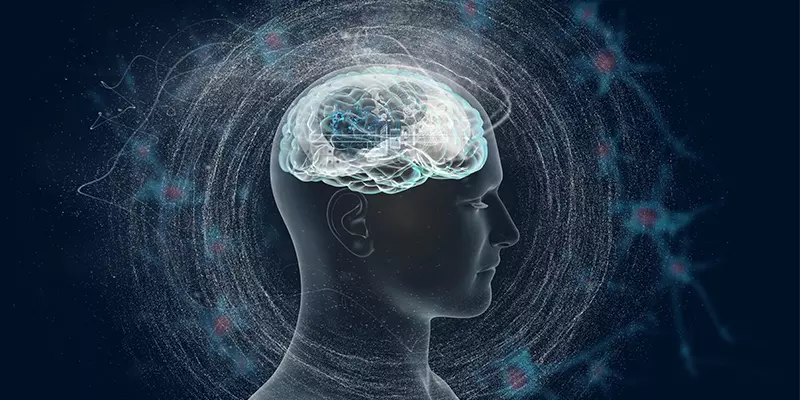
Are you becoming more forgetful? You might chalk it up to your age, but a surprising culprit may be hypothyroidism, which occurs when the thyroid gland doesn’t produce enough thyroid. Underactive thyroid is most known for wreaking havoc on energy levels, moods, and weight gain or loss, but memory loss is also a major factor in untreated thyroid dysfunction. A 2022 study found that people with thyroiditis (inflammation of the thyroid) were more likely to have Alzheimer’s disease and other research published in the journal Neuroendocrinology shows that overall cognitive decline is common in people with thyroid issues. Is hypothyroidism impacting your memory?
Research published in 2022 found that people 65 and older with a history of hypothyroidism showed an 81% increased risk of having dementia. Click To TweetOVERVIEW OF THE THYROID AND HYPOTHYROIDISM
The thyroid is a gland located at the front of your neck. Its main function is to control metabolism speed, which then distributes energy throughout the body. The hormones that relate to your thyroid are triiodothyronine (T3) and thyroxine (T4). Among the many functions they perform, these hormones control your weight; energy levels; internal temperature; the growth of your skin, hair, and nails; metabolism; and brain development.
When the thyroid isn’t working properly it can cause serious health consequences that affect numerous organs, neuronal development, and cellular metabolism. Thyroid issues are highly common in Americans and becoming more so in recent years. According to a 2019 report in Advances in Therapy, nearly 5% of Americans have hypothyroidism and another 5% have it but don’t know it. And the condition is 8-9 times more common in women compared with men.
SYMPTOMS OF HYPOTHYROIDISM
There are many symptoms associated with thyroid dysfunction, and memory loss is one of them. Other symptoms of hypothyroidism include:
- Fatigue
- Weight gain
- Constipation
- Slow movements and thoughts
- Depressive symptoms
- Low sex drive
- Carpel tunnel symptoms (numbness, tingling, and pain in hands)
- Muscle aches, pains, cramps
- Brittle hair
- Dry skin
These symptoms tend to be mild at first and develop gradually. Because of this, some people may think they are simply due to aging or other issues. This is one of the reasons why it can take months or years before a person is diagnosed with hypothyroidism.
THE RELATIONSHIP BETWEEN HYPOTHYROIDISM AND MEMORY
Memory problems can occur for a variety of reasons including chronic inflammation, a history of Alzheimer’s disease, depression, alcoholism/substance abuse, sleep disorders, and more. A malfunctioning thyroid is another important consideration when evaluating memory issues. A study published in Neuropsychiatry found that people with hypothyroidism scored lower on verbal memory recall or language-based memory, both markers for short-term memory.
A 2020 study found that hypothyroidism is associated with cognitive impairment. The researchers concluded that this is also true with subclinical hypothyroidism, which is a mild form of the condition. This same study suggests that as TSH (thyroid stimulating hormone) increases so does dementia, particularly as people age. Hypothyroidism can cause widespread cognitive decline, especially memory difficulties, and hyperthyroidism and thyroiditis (inflamed thyroid) are responsible for focus problems, attention issues, and difficulty concentrating. Research published in 2022 found that people 65 and older with a history of hypothyroidism showed an 81% increased risk of having dementia.
The hippocampus is a major player in learning and memory and is greatly affected by the thyroid. If thyroid hormone levels are out of whack this can impair learning and memory in the hippocampus. Neuroplasticity (how the brain changes when we learn or memorize new things) and neurogenesis (the formation of new neurons in the hippocampus) decline in the face of thyroid issues. Research published in the journal Thyroid showed an area of the hippocampus was 12% smaller in participants who have hypothyroidism compared with those without thyroid dysfunction.
SPECT scans of Amen Clinics patients with hypothyroidism show decreased levels of brain activity, which can result in cognitive impairment and other issues such as brain fog, anxiety, and depression.
FACTORS THAT CONTRIBUTE TO HYPOTHYROIDISM
Several environmental factors and lifestyle habits can contribute to hypothyroidism, including:
- Stress/excess cortisol
- Deficiency of selenium
- Environmental toxins such as mercury, cadmium, and lead
- Pesticides and herbicides
- Not consuming enough protein
- Consuming too much sugar/processed foods
- Kidney and liver issues
- Chronic illnesses
- Hormonal birth control and excess estrogen
LAB TESTS FOR HYPOTHYROIDISM
If you suspect a problem, it’s a good idea to have your thyroid levels checked. Here are the tests you need to know.
Thyroid Panel (blood test) – If you have symptoms, don’t settle for just a TSH test, which measures your thyroid stimulating hormone. TSH levels can be normal even when you have an undiagnosed thyroid problem. Instead, insist that your doctor order all of the following:
- TSH – a high TSH level indicates that the thyroid gland may not be producing enough thyroid hormone while a low TSH level is a sign that too much thyroid hormone is being produced
- Free T3 – active thyroid
- Free T4 – inactive thyroid
- Thyroid antibodies
- Thyroid peroxidase antibodies (TPO)
- Thyroglobulin antibodies (TG)
HOW TO IMPROVE THYROID HEALTH NATURALLY
To keep your hormones healthy and protect your memory, eliminate or reduce anything that hurts them and focus on foods and activities that enhance them.
- Stop smoking
- Reduce exposure to pesticides
- Avoid processed foods
- Limit sugar intake
- Avoid unhealthy fats
- Limit wheat
- Reduce caffeine intake
- Limit alcohol consumption
- Maintain a healthy weight
- Get adequate sleep
- Exercise on a regular basis
- Do strength training
- Eat a brain-healthy diet
- Manage your stress
- Take nutritional supplements, such as l-tyrosine, zinc, iodine, and ashwagandha extract, which support thyroid function
If you have unexplained memory loss, it’s worth investigating if hypothyroidism may be a contributing factor. A comprehensive memory evaluation that includes lab testing and brain SPECT imaging can be helpful in finding the root cause of memory problems.
Memory loss and other cognitive and mental health issues can’t wait. At Amen Clinics, we’re here for you. We offer in-clinic brain scanning and appointments, as well as mental telehealth, clinical evaluations, and therapy for adults, teens, children, and couples. Find out more by speaking to a specialist today at 888-288-9834 or visit our contact page here.





I had a thyroid blood panel done and my TSH is way high > 6 but my T3 and T4 is normal. Doc repeated test a month later with same results. Doc is not doing anything about it. Should I be concerned ?
Comment by George — June 16, 2023 @ 6:34 AM
It would be interesting to see to what extent the use of thyroid medication for diagnosed hypohyroidism would serve to alleviate this risk factor for cognitive decline.
Comment by Johann Nepgen — June 16, 2023 @ 10:49 AM
I have been taking Levothyroxine for years,,started out 25mg, now 50mcg a day,,,, I am 84+ years old and in very good health, see my family Dr. once a year in Dec. The drug I am taking is not mentioned in your discussion of "brain fog", There are times I can't recall a name and I have to search for it or ignore it, Does the drug I am taking help? and in what way?
Comment by Ann Anash — June 16, 2023 @ 10:56 AM
Thanks for the info I have hypothyroidism for at least 40 years. I stop my medicine a few months ago because of the side effects. Doctor wants me to start back but I feel much better without it so far I haven't started it back
Comment by Diane — June 16, 2023 @ 2:08 PM
My mom (95) was diagnosed with hypothyroidism, and had been taking levothyroxine for past 3 months. Will this help any with memory?
Comment by T Palo — June 17, 2023 @ 9:44 AM
I have been getting your e-mails for several years , this one really was an eye open opener for me. I had to have my thyroid out several years ago.
Comment by Cindy Dean — June 19, 2023 @ 2:56 AM
You don't mention Selenium supplements. Wouldn't that be helpful? What dosage?
Comment by Darlene — June 19, 2023 @ 5:41 AM
Is the outcome identified in this article, 81% increased risk of having dementia, for all persons with hypothyroidism? What about individuals who have been treated for the condition for years? Is the prognosis better for them? Give us some hope!
Comment by M McGann — June 21, 2023 @ 12:16 PM
I have been taking some things called Thyroid Harmony for a few weeks it has in it zinc, selenium L Throisne Ashwangandha root extract among other things.
I am very impressed. I get so much done each day.
I will continue to take it.
Comment by Kathy Stockdale — July 3, 2023 @ 10:21 AM